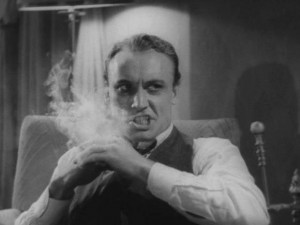FILM: Musicians under the influence of Reefer Madness
Posted on February 22, 2013 By Mike Ross Entertainment, entertainment, Film, Front Slider
 You don’t have to be high to enjoy “Reefer Madness” ironically – but it helps.
You don’t have to be high to enjoy “Reefer Madness” ironically – but it helps.
Or does it?
There are a number of misconceptions about the famous 1936 anti-marijuana film, according to Edmonton musician Gene Kosowan, who has created a live “electro-acoustic” reinterpretation of the movie being presented at Wunderbar on Sunday night.
“There’s something comically pathetic about raising hysteria over a plant,” he says, via email. “It’s almost like the United Farmers of Alberta waging a cinematic war against Canada thistle. I guess you have to consider that smoking marijuana was pretty central to Boomers’ recreation activities in the ‘60s and there were no ill effects to the magnitude of what the film hinted at. The fact that the effects of weed are pretty innocuous by any standards probably made users wonder what the fuss was all about, which in turn delivers a whole new sense of irony.”
Watching the now-public domain film, which has even been made into a comedic musical, Kosowan says he was surprised how it doesn’t even come close to living up to the anti-drug propaganda hype surrounding it. Reefer Madness isn’t really about fear of weed. It’s more about the fear of organized crime.
“Gangsters who made a killing on bathtub gin in the ‘30s found marijuana to be a lucrative cash cow and are seen in the film luring teens into lofts and supplying them with weed,” Kosowan says. “If anything, Reefer Madness plays up the fear of Mafia influence on youth, which I found to be remarkably parallel to the post-911 paranoia concerning any instances of Islamic jihadism in our own backyards. I remember it unleashed a wave of intolerance in pop culture led by the likes of Toby Keith, and I think some of us are still dealing with that backlash, which certainly had artistic freedom on the ropes for a while. Replace gangster hangouts with sleeper cells and you’ve got a whole new perspective on an old movie.”
Under Kosowan’s alias “fl3m,” this “fl3mscape” is much along the same lines as the occasional screenings of silent films with live soundtracks that the Edmonton Symphony Orchestra puts on. He also cites Dave Clarke’s theremin treatment of The Cabinet of Dr. Caligari: “Songs for Caligari,” a hit at the 2010 Edmonton Fringe Festival. Kosowan chopped Reefer Madness down to 45 minutes, replaced the speaking parts with captions and added his own “industrial” soundtrack. “Surreal” is the effect he’s going for (as if the original film isn’t surreal enough), the goal being more Eraserhead than Pink Floyd, Kosowan says.
 The night will also feature fellow Boreal Electro Acoustic Music Society (BEAMS) member Shawn Pinchbeck doing a similar treatment on a French short called Un Chien Andalou, made by Luis Brunel and artist Salvador Dali in 1929, “which is easily the weirdest thing” in the program. San Diego musician Marion Garver Fredrickson will perform improvised flute over the famous 1902 silent film “Voyage to the Moon,” and Allison Balcetis will play saxophone to Thomas Edison’s 1910 short “Frankenstein.”
The night will also feature fellow Boreal Electro Acoustic Music Society (BEAMS) member Shawn Pinchbeck doing a similar treatment on a French short called Un Chien Andalou, made by Luis Brunel and artist Salvador Dali in 1929, “which is easily the weirdest thing” in the program. San Diego musician Marion Garver Fredrickson will perform improvised flute over the famous 1902 silent film “Voyage to the Moon,” and Allison Balcetis will play saxophone to Thomas Edison’s 1910 short “Frankenstein.”
You don’t get this sort of entertainment in a bar every day – especially on Oscar night. There’s an extra layer of irony given the fact that this is not considered one of Hollywood’s great movies. As for a political agenda here, there isn’t one, Kosowan says – beyond putting a new twist on old movies.
One more thing: like the music of Pink Floyd, would this sort of thing sound better if the observers were high? Or if the performers were high?
Kosowan replies, “I don’t know if I’m really in a position to comment on the effect of avant-garde electronics on someone who’s stoned, although I did recently complain to someone about the cookie-cutter mentality of electronic dance music. She replied that with everyone strung out on ecstasy at a rave, if anyone tried to play anything weird, the audience would totally freak out and destroy the place. That said, it’s not likely any of the performers will be high, especially after finding out Wunderbar didn’t include munchies in their budget.”











